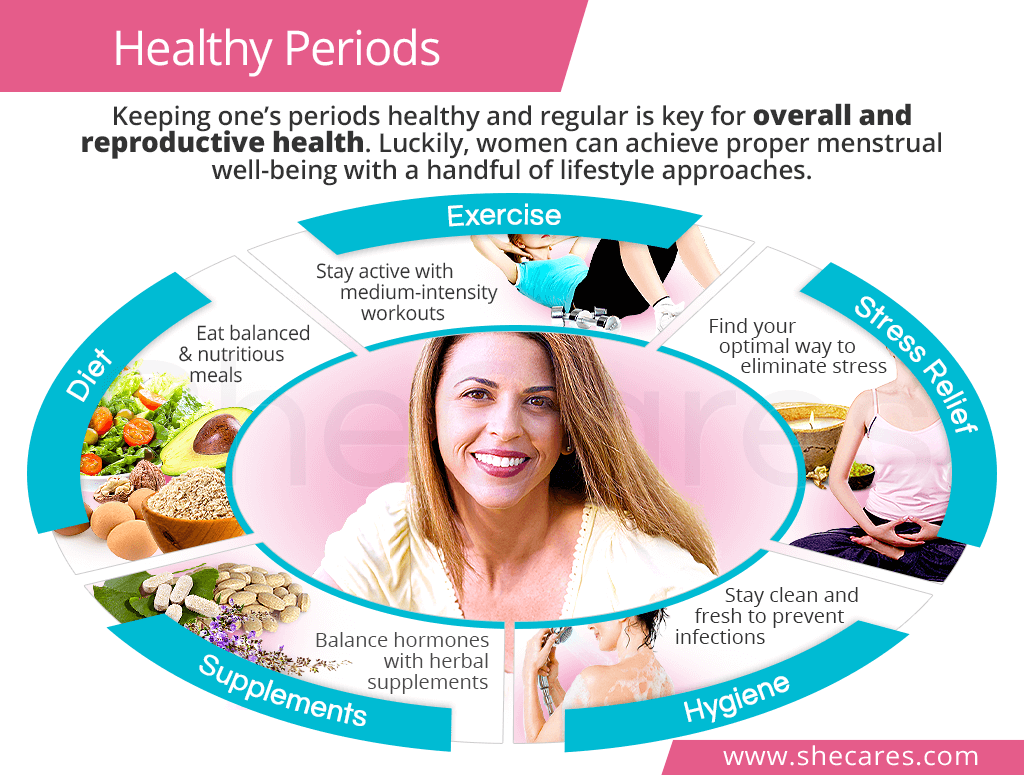Diet for Healthy Periods

The truth is that there are no specific foods that will keep a woman's periods regular. Maintaining a period-healthy diet is all about balance. Consuming small, frequent meals throughout the day made with foods rich in the following nutrients:
- Lean protein, such as beans, eggs, fish, and chicken
- Healthy fats, such as avocado, walnuts, and olives
- Complex carbs, such as quinoa, buckwheat, and brown rice
- Vitamins and minerals (especially iron, calcium, B vitamins, and magnesium), like spinach, nuts, and seeds
Some women may experience food cravings around their periods. While occasional indulgence is not harmful, eating too many sweets or salty foods is not recommended as it may trigger or worsen premenstrual syndrome (PMS).
Exercise for Healthy Periods

In order to keep their hormones and periods in check, women are also encouraged to keep a steady level of physical activity throughout the month. It is a good idea to take note of the following recommendations:
- Women should get 30 minutes of moderate exercise or 75 minutes of vigorous exercise per day, 5 times a week.1
- The best workouts for periods combine aerobics with muscle-strengthening routines.
- Proper hydration is key when it comes to keeping workouts safe and effective.
- Exercising too much can cause menstrual disorders, including absent periods.
By staying active, women may relieve bloating, mood swings, and other period-related symptoms. It will also help them maintain a healthy weight and prevent obesity, which is one of the most common causes of hormonal imbalance.
Stress Relief for Healthy Periods

While it may seem that being stressed is inevitable in this day and age, keeping stress at bay is crucial for healthy periods. It is because high cortisol levels can disrupt the endocrine system, causing period irregularities.2 The following ideas may help:
- Mindfulness, yoga, and deep breathing exercises
- Natural therapies, such as acupuncture or massage therapy
- Spiritual and religious practices
- Hobbies, volunteer work, and support groups
- Psychotherapy, such as cognitive-behavioral therapy (CBT)
Studies have also shown that unresolved mental health conditions, such as depression or anxiety, may cause menstrual irregularities, including having short cycles or no periods at all.3
Supplements for Healthy Periods

A balanced diet should satisfy most women's nutritional needs and ensure regular periods, without the need for supplementation. However, in the case of hormonal imbalances, supplements for irregular periods may come in handy. They include:
Phytoestrogenic supplements, such as chasteberry, may resolve hormonal abnormalities and regulate periods. Because they may make the body less capable of producing its own hormones, they are best used short-term.
Hormone-regulating supplements, such as Macafem, are the best option for lasting hormonal balance and menstrual health. Because they work directly on the endocrine glands, they can be used long-term.
Nutritional supplements may be needed to regulate periods if a woman is diagnosed with specific nutritional deficiencies, such as iron, B vitamins, vitamin D, calcium, and more.
Period Hygiene
Staying clean while on a period as well as throughout the month is an essential part of maintaining healthy periods. Improper hygiene can lead to infections that, in turn, may lead to menstrual abnormalities. Consider the following:
- Proper cleaning routine should consist of daily showers and choosing natural cleaning products.
- Selecting the right period products and choosing them frequently is key for optimal period health.
- Also essential for healthy periods is wearing natural, breathable, and well-fitted underwear.
Additionally, period tracking is the best way to keep periods healthy and regular. When done consistently, it helps women monitor their menstrual patterns and notice menstrual abnormalities early on.
Key Takeaways
A woman's periods are a great indicator of her overall health and a key determinant of her reproductive potential. As such, keeping them in check is of the utmost importance. Fortunately, most women can achieve proper period health with a handful of lifestyle tweaks.
This includes eating a balanced diet and keeping tabs on period cravings as well as staying physically active and avoiding strenuous workouts. To prevent stress disrupting the endocrine system and menstrual regularity, women should find optimal ways to release it on a regular basis. When in need of a boost, various supplements can help restore hormonal balance and healthy menstruation. Lastly, putting efforts into maintaining proper hygiene will help prevent infections that may throw periods out of whack.
Sources
- Better Health Channel. (2015). Nutrition – women's extra needs. Retrieved December 10, 2020 from https://www.betterhealth.vic.gov.au/health/healthyliving/nutrition-womens-extra-needs
- BioMed Research International. (2013). Association of Iron Depletion with Menstruation and Dietary Intake Indices in Pubertal Girls: The Healthy Growth Stud. Retrieved December 10, 2020 from https://www.ncbi.nlm.nih.gov/pmc/articles/PMC3885188/
- BMC Women's Health. (2018). Major dietary patterns in relation to menstrual pain: a nested case control study. Retrieved December 10, 2020 from https://www.ncbi.nlm.nih.gov/pmc/articles/PMC5963185/
- Health Promotion Perspectives. (2015). The Association between the Risk of Premenstrual Syndrome and Vitamin D, Calcium, and Magnesium Status among University Students: A Case Control Study. Retrieved December 10, 2020 from https://www.ncbi.nlm.nih.gov/pmc/articles/PMC4667262/
- Journal of Research in Medical Sciences. (2014). The effect of calcium and vitamin D supplementation on menstrual cycle, body mass index and hyperandrogenism state of women with polycystic ovarian syndrome. Retrieved December 10, 2020 from https://www.ncbi.nlm.nih.gov/pmc/articles/PMC4268197/
- Mayo Clinic. (2019). Menstrual cycle: What's normal, what's not. Retrieved December 10, 2020 from https://www.mayoclinic.org/healthy-lifestyle/womens-health/in-depth/menstrual-cycle/art-20047186
- Office on Women's Health. (2019). Weight loss and women. Retrieved December 10, 2020 from https://www.womenshealth.gov/healthy-weight/weight-loss-and-women
- Reproductive Biology and Endocrinology. (2015). Lower plasma 25-hydroxyvitamin D is associated with irregular menstrual cycles in a cross-sectional study. Retrieved December 10, 2020 from https://www.ncbi.nlm.nih.gov/pmc/articles/PMC4359493/
- The Royal Women's Hospital. (n.d.). Exercise, diet & periods. Retrieved December 10, 2020 from https://www.thewomens.org.au/health-information/periods/healthy-periods/exercise-diet-periods
- The Royal Women's Hospital. (n.d.). Healthy period. Retrieved December 10, 2020 from https://www.thewomens.org.au/health-information/periods/healthy-periods
Footnotes:
- American Health Association. (n.d.). American Heart Association Recommendations for Physical Activity in Adults and Kids. Retrieved December 10, 2020 from https://www.heart.org/en/healthy-living/fitness/fitness-basics/aha-recs-for-physical-activity-in-adults
- Cleveland Clinic. (2020). Can Stress Cause You to Skip a Period? Retrieved December 10, 2020 from https://health.clevelandclinic.org/can-stress-cause-you-to-skip-a-period/
- Office on Women's Health. (2018). Reproductive health and mental health. Retrieved December 10, 2020 from https://www.womenshealth.gov/mental-health/living-mental-health-condition/reproductive-health-and-mental-health
